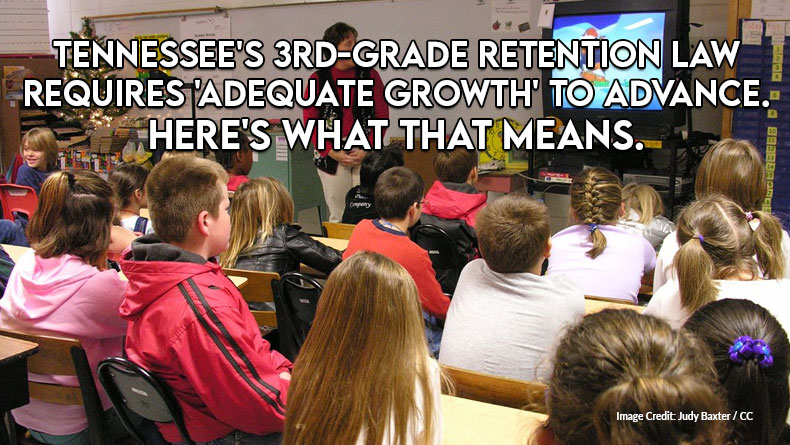This story was originally published by Chalkbeat. Sign up for their newsletters at ckbe.at/newsletters.
Image Credit: Judy Baxter / CC
by Marta W. Aldrich, Chalkbeat Tennessee –
When Tennessee lawmakers passed a tough third-grade retention law in 2021, they ordered districts to provide academic interventions like summer learning camps to help struggling readers get promoted on time.
The law also says third graders who score just below reading proficiency must show “adequate growth” on a test given at the end of those camps in order to advance to fourth grade.
But the statute didn’t define “adequate growth,” and policymakers have debated ever since what that ambiguity means.
On Friday, the State Board of Education provided an answer: To get promoted, students who scored as “approaching” reading proficiency on their state test this spring must improve by at least 5 percentage points on another state test given at the end of their summer learning program.
“This definition is intended to capture a reasonable amount of growth a student could achieve during the four-week camp, relative to the student’s achievement during an entire school year,” said Sam Pearcy, Tennessee’s deputy education commissioner, while presenting his department’s recommendation to the board.
The definition was the most pressing question lingering over the controversial new retention policy outlined in the state’s 2021 learning acceleration law. That policy, which kicks in with this year’s third graders, is expected to cause thousands of students to attend summer school in the next few months or undergo tutoring next school year to avoid being held back.

Questions and complaints pick up as score data goes out
Members of the state board said they’ve received other questions daily about the law — everything from tutoring access to how to appeal to the state to get exempted from the policy. State-provided tutoring is Tennessee’s other intervention program for struggling readers under the 2021 law.
“We’re going to continue to work through the process,” board Chairman Bob Eby, of Oak Ridge, said Friday. “It’s not perfect, but the intent is right.”
Warren Wells, a board member from Shelbyville, said critics have called the retention law “ridiculous” and said that it “wasn’t thought through.” But he countered that it was the right response to unprecedented learning disruptions caused by the pandemic.
“This year is going to be hard,” Wells acknowledged, “but we are going to continue to look at it and make sure that we make the best decisions for the future of our children.”
Also late Friday afternoon, school districts received preliminary scores from the state tests taken this spring, kicking off a busy few days of analysis and communication with parents about what those results mean. Most families should have information by Monday or Tuesday about how their third grader performed, so that they can make decisions about whether their student should retest next week to try for a better result, or will have to enter learning intervention programs this summer or fall.
The preliminary testing information won’t be publicly released, however, said Brian Blackley, a spokesman for the education department.
Early reading scores for individual third graders are confidential, said Blackley, and “meant to give districts prompt, actionable data as quickly as possible to help students and families.”
Statewide and district-level results from the Tennessee Comprehensive Assessment Program, or TCAP, will be released publicly this summer, he added.
Board irons out a wrinkle in ‘adequate growth’ policy
Before approving the definition for “adequate growth,” the board made a late change to the department’s recommendation to address concerns that some third graders who scored “approaching” proficiency this spring could unwittingly be penalized for retaking their reading test next week.
If those students improve their baseline score on the do-over but still aren’t deemed proficient readers, they would have to score even higher on the summertime post-test to improve by 5 percentage points.
“Then there’s no incentive for the individual to take that retake test,” Eby said.
For such cases, the board set spring TCAPs, not the retake assessment, as the baseline test.
The “adequate growth” requirement will not apply to students who scored “below” proficiency, the state’s bottom category, on either the TCAP or retake tests. The law requires those students to participate in both a summer learning camp and state-funded tutoring throughout fourth grade to get promoted.
All rising fourth graders who participate in summer camps also must maintain a 90% attendance rate in those programs, as stipulated in the law.
School leaders welcome answers
The post-test won’t be the TCAP, but state officials say testing vendor Pearson is developing the assessment to be a “TCAP-style” test. Questions will align with state academic standards, and the test will not include the writing portion that TCAPs do.
“Post-test results are able to be returned immediately because they exclude a writing component which takes more time to score,” according to one state document. “Adequate growth calculations will be returned within five business days of the administration of the post-test.”
While third-grade TCAPs were conducted with pencil and paper, the post-test will be conducted on devices using Schoolnet, an online platform launched by the state in 2020 to provide free and optional assessments to school systems.
Districts must use Schoolnet to give retake tests next week, as well as tests at the end of summer camp. Many schools already use Schoolnet to give extra benchmark tests to third graders during the school year, and the state delivered last year’s summer post-test via the platform as well.
Several district leaders told Chalkbeat they were comfortable with the state’s newly set growth bar.
Memphis-Shelby County Schools already targets growth of 3 to 5 percentage points during each of its three tutoring terms during the school year.
“So 5 percentage points is pretty close to the gauge we’re using internally for tutoring,” said district spokeswoman Cathryn Stout. “It’s on the high end, but it’s in the realm of possibility.”
Breckan Duckworth, who oversees summer programming for Hamilton County Schools, said it’s difficult to gauge whether the state’s growth definition is reasonable because it depends on whether the post-test is as rigorous as TCAPs.
“I do know that our kids tend to show growth and do well on the assessments that are provided during summer programming,” Duckworth said.
“Would I be happier if it was a little lower than 5 percentage points? Absolutely,” she said. “But at this point, it’s not going to keep me up at night.”

About the Author: Marta Aldrich is a senior correspondent and covers the statehouse for Chalkbeat Tennessee. Contact her at maldrich@chalkbeat.org.


